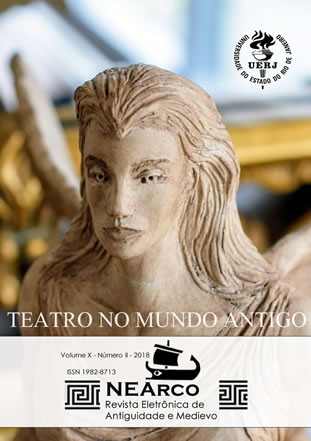ON NOT MANAGING MOURNING: THE RETICENT CHORUS IN SOPHOCLES’ ANTIGONE
Palavras-chave:
Sophocles, Ancient Greece, Greek TragedyResumo
This paper discusses the reticence of the chorus in the Antigone’s two scenes of lyric dialogue which are cast as ritual laments (thrēnoi): the heroine’s interaction with the chorus in the fourth episode, before she marches off to her death, and the final kommos of Creon, when he laments the deaths of his son and wife. My discussion illustrates the manner in whichSophocles “manages”the choral response within the larger framework of ritual lament, by either gradually or straightforwardly silencing the expected lamentation of the chorus. In doing so, I contend that the dramatist produces moments of broken antiphony, in which the chorus either partially participates in or simply does not contribute to the lament of a character on stage. My exploration reveals the manner in which collective mourning rituals are able to break down on the Sophoclean stage, in particular focusing on the impact of the chorus’ refusal to respondand engage in the communal act of lament, whichultimately works to isolate further the play’s protagonists.
Downloads
Downloads
Publicado
Como Citar
Edição
Seção
Licença
Autores que publicam na NEARCO: Revista Eletrônica de Antiguidade e Medievo concordam com os seguintes termos:
a) Os autores mantém os direitos autorais e concedem à revista o direito de primeira publicação, com o trabalho simultaneamente licenciado sob a Licença Creative Commons Attribution que permite o compartilhamento do trabalho com reconhecimento da autoria e publicação inicial nesta revista
b) Os autores têm autorização para assumir contratos adicionais separadamente, para distribuição não-exclusiva da versão do trabalho publicada nesta revista (ex.: publicar em repositório institucional ou como capítulo de livro), com reconhecimento de autoria e publicação inicial nesta revista.
c) Os autores têm permissão e são estimulados a publicar e distribuir seu trabalho online (ex.: em repositórios institucionais ou na sua página pessoal) a qualquer ponto antes ou durante o processo editorial, já que isso pode gerar alterações produtivas, bem como aumentar o impacto e a citação do trabalho publicado (Veja O Efeito do Acesso Livre).

Este obra está licenciado com uma Licença Creative Commons Atribuição-NãoComercial 4.0 Internacional.









